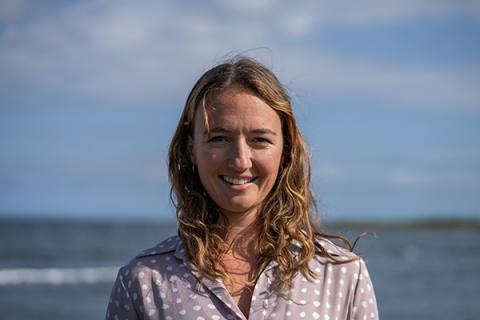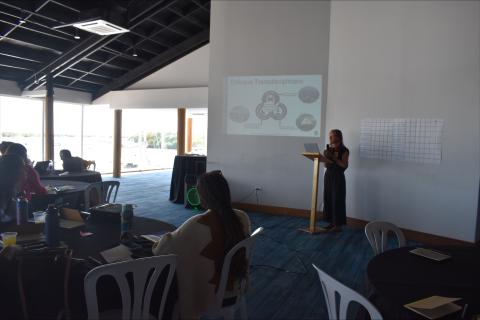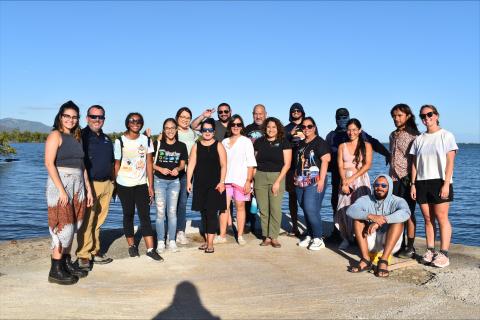Knauss Fellow Natalie Lord Buoys Coastal Acidification Networks

New Hampshire Sea Grant’s 2023 Knauss Fellow Natalie Lord has spent the past few months working with the National Oceanographic and Atmospheric Administration’s (NOAA) Ocean Acidification Program (OAP) in her new role as the Stakeholder Engagement and Capacity Building Fellow.
The Knauss Fellowship, currently in its 44th year, honors John A. Knauss, a founder of the National Sea Grant College Program, who formerly served as a NOAA administrator and dean of the University of Rhode Island’s Graduate School of Oceanography. Since 1979, over 1,550 early-career professionals have participated in this year-long paid fellowship that matches highly qualified graduate students with host offices in the legislative and executive branches of the U.S. government in Washington, D.C. Fellows work on national policy issues affecting ocean, coastal, and Great Lakes resources.
Natalie earned her master’s degree in in Natural Resource Management: Environmental Conservation and Sustainability from the University of New Hampshire’s Department of Natural Resources and the Environment last fall. She received her Bachelor of Science in Biology and Bachelor of Arts in Spanish from St. Lawrence University.
During her Knauss Fellowship at the NOAA Ocean Acidification Program, Natalie is working directly with the national Coastal Acidification Networks (CANs) to fund and coordinate research, support regional educational programs and workshops, and gather stakeholder input to guide policy and research priorities. While many Knauss fellowship placements are heavily focused on policy, Natalie’s role at OAP weaves her interests in research, program management, and stakeholder engagement into the policy process.
With the OAP, Natalie helps networks of researchers and stakeholders around the country to better understand and monitor the current state of Ocean Acidification – the lowering of pH in our oceans and waterways caused by an increase in dissolved carbon dioxide, which forms an acid in water – and to better plan for ocean acidification’s future effects on our ecosystems, communities, economies, and infrastructure.

As part of her fellowship, she’s been able to leverage her Spanish language skills. Already, she’s traveled to Puerto Rico as part of a Regional Vulnerability Assessment where she presented on behalf of NOAA OAP in Spanish, to a fully Spanish-speaking audience. She has also been able to create educational and outreach materials for Spanish-speakers.
Completing a presentation in her second language has been the most rewarding part of Natalie’s fellowship so far. “I was finally able to use that skill again. My office was super supportive of taking that time for professional development to study Spanish beforehand,” she shared.
Spending time with stakeholders in Puerto Rico at the workshop also allowed Natalie to gather first-hand feedback on OAP’s programs and funding mechanisms. “Talking to stakeholders directly, taking that information to our program director, and using that to identify opportunities for funding ocean acidification research gaps for Caribbean fisheries, that full circle was a really great learning opportunity for me.”
Natalie’s work extends further than Puerto Rico. She has been coordinating webinars and facilitating meetings with CAN networks in California, Alaska, and the Northeast. She’s also participated in science communication efforts by designing factsheet documents, running social media campaigns, and sharing her work with stakeholder audiences. Next on her agenda is a national stakeholder needs assessment for OAP’s program review and to learn how to better assist coastal communities with ocean acidification research, monitoring, and outreach.
A Knauss Fellowship at the OAP was her first choice in the competitive Knauss finalist placement process, and she’s glad she ended up there. In the next few months, Natalie will be traveling to Spain to present her results from a needs assessment survey conducted in the Caribbean region at the conference for the Association for Sciences on Limnology and Oceanography as well as the Association of Marine Laboratories of the Caribbean conference in St. Kitts.
The Knauss experience has given Natalie insight into the function of a federal agency, seeing how efforts progress from policy to execution. “It’s been really interesting to learn how the whole system works,” Natalie said.
For more information about graduate fellowship opportunities through NH Sea Grant, click here
